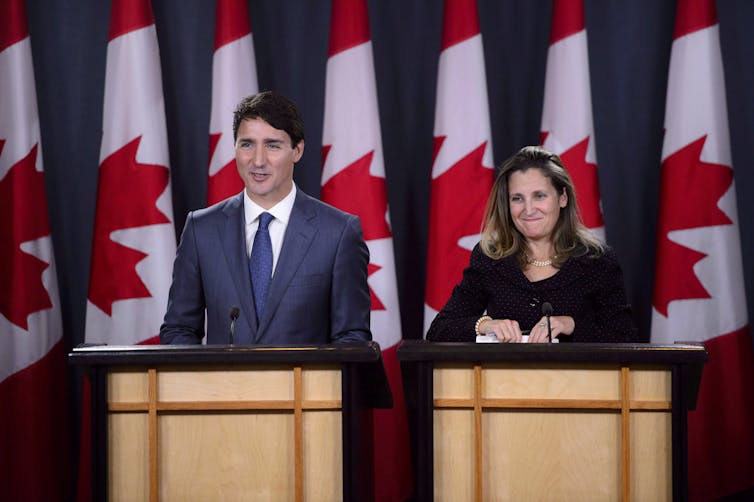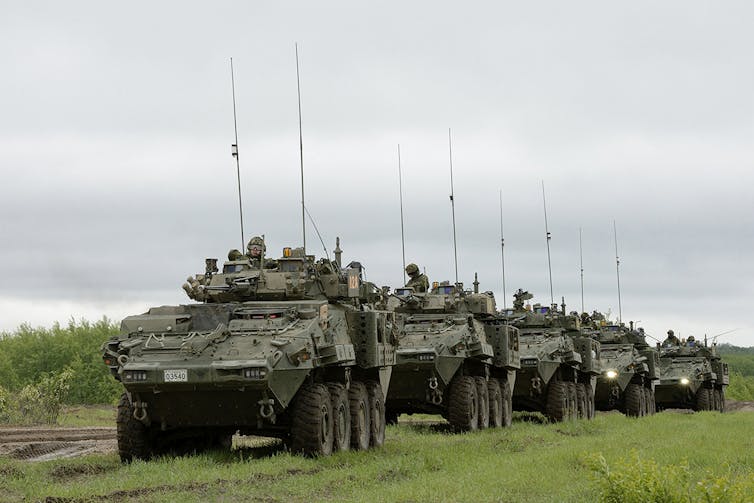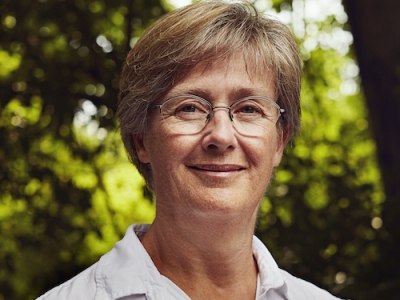By Stuart J. Murray
This article is republished from The Conversation under a Creative Commons licence. All photos provided by The Conversation from various sources.
When the CIA announced that Saudi Crown Prince Mohammed bin Salman likely ordered the brutal killing of Washington Post journalist Jamal Khashoggi, my colleagues and I published an opinion piece in a Canadian newspaper. We were critical of our government’s response, which doubles down on its rhetoric of “human rights” while failing to take any concrete action.
“We will continue to stand up for Canadian values and indeed for universal values and human rights at any occasion,” Prime Minister Trudeau said in August.
“Continue”? And “at any occasion?” But why not now, and on this occasion?
Foreign Affairs Minister Chrystia Freeland has offered an explanation that she framed as morally virtuous: “When it comes to existing contracts, our government believes strongly that Canada’s word has to matter.”

Canada’s $14.8 billion contract to sell armoured combat vehicles to Saudi Arabia could not be jeopardized. Cancelling it would carry penalties somewhere in the range of “billions of dollars,” the prime minister tells us. And besides, this deal will reportedly create 3,000 jobs over 14 years in southwestern Ontario. This too is significant. But the trade-off is stark: the death of some in exchange for the livelihood of others. This can be none other than what we called a “sacrificial economy.”
‘Everybody knows’
If I could choose a soundtrack for the Jamal Khashoggi affair, it would be the ghostly voice of Leonard Cohen singing “Everybody Knows.” The refrain is familiar. Everybody knows about Canada’s lucrative armoured vehicle contract with the Saudi regime. Everybody knows the deal is rotten.
Everybody knows that these are weapons and do not serve the same humanitarian purposes as books or pharmaceuticals or grain. Everybody knows that they deliver death and destitution and that they have helped to produce what the United Nations has called the worst man-made humanitarian crisis of our time in Yemen.
Everybody knows that a Washington Post journalist is not the only victim of these economies — there are countless dead who have no voice, and it is especially tragic that someone positioned to speak on their behalf was himself assassinated.
Everybody knows — or should know — that in 2017 alone, Canada sold just under $500 million worth of guns, training gear, imaging and countermeasure equipment, bombs, rockets, drones and unspecified chemical or biological agents to Saudi Arabia. We have also sold guided missiles to Bahrain, and different weapons to the United Arab Emirates — both of which support Saudi military action in Yemen.

We have also sold military helicopters to Rodrigo Duterte’s regime in the Philippines. The list goes on. So even if one Saudi contract is cancelled, not much is likely to change.
Dice are loaded
But even without these details, everybody knows that the dice are loaded. In my research, I examine the ethical relationship between the modern state’s power to “make live” and “let die” — which also means indirect killing. This is what the French philosopher Michel Foucault called “biopolitics,” a deadly and differential politics where life itself is both the means and the end of political power.
Sacrificial deaths go by many euphemisms: collateral damages (in war), opportunity costs or negative externalities (in economics). But negative “externality” is misleading here. The negation of life, or “letting die,” is internal to this general economy, a moral economy that silently underpins the rules of international law, diplomacy and trade. Everybody knows, but nobody knows what to do with this knowledge.
It is, then, as if Khashoggi’s murder — along with innumerable others less spectacular or publicized — are factored in as a tolerable threshold of death in the name of life and livelihood. This is not new, but the scale of mass destruction and its technological automation should give us pause as we contemplate the roboticization of weapons and algorithmic warfare.
The sacrificial economy has its own sinister principles of accounting. As British intellectual and forensic architect Eyal Weizman has documented in The Least of All Possible Evils, the U.S. military has tolerable thresholds of civilian deaths for each military death; Israeli blockades in Gaza have counted the calories of food entering Gaza, based on average per-person consumption (2,100 calories per male and 1,700 per female).
Violence as virtue
Violence is framed as a moral virtue, obeying “proportionality” or the “humanitarian minimum.” Outside the theatres of war, and in the Canadian context, what is the tolerable threshold of carbon emissions and climate change to sell our oil, or the tolerable threshold of First Nations communities without access to clean drinking water? More sacrifice.
It would be unjust to blame Trudeau or Freeland entirely for our sacrificial economy. As Cohen writes, “That’s how it goes / Everybody knows.”
But there is, still, the matter of Canada’s word, our collective values and the willingness of each Canadian to remain complicit or to knowingly resist. Khashoggi’s death is significant not just for its attack on the freedom of the press, but because it occasions a grave conversation on the relationship between our livelihood as Canadians and the countless deaths that this livelihood calls for and quietly condones.
![]()
Wednesday, November 28, 2018 in The Conversation
Share: Twitter, Facebook



